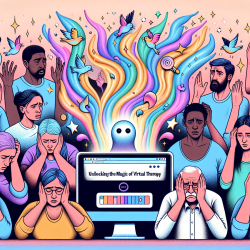As the landscape of education continues to evolve, one area experiencing significant transformation is special education. With the increasing demand for specialized services and the ongoing therapist staffing shortages, schools are looking for innovative solutions to meet the needs of their students. Online therapy services, like those provided by TinyEYE, are emerging as a game-changer in this field.
The Growing Need for Online Therapy in Schools
In recent years, there has been a notable increase in the number of students requiring special education services. This rise can be attributed to better diagnostic practices and greater awareness of mental health issues among children. However, this increased demand has also led to a shortage of qualified therapists in many school districts. Traditional in-person therapy services often struggle to keep up with this demand, leading to long wait times and inconsistent support for students. This is where online therapy services, also known as telepractice, come into play. By leveraging technology, schools can provide timely and consistent support to their students, regardless of geographical limitations.
What is Online Therapy?
Online therapy, or telepractice, involves delivering therapeutic services through digital platforms. This can include a range of services such as speech therapy, occupational therapy, and mental health counseling. The therapy sessions are conducted via video conferencing tools, allowing students to receive the support they need from the comfort of their own school or home.
Benefits of Online Therapy Services
The advantages of online therapy services are numerous, making them an attractive option for schools and government health regulators alike. Here are some key benefits:
- Accessibility: Online therapy breaks down geographical barriers, ensuring that students in remote or underserved areas have access to quality therapeutic services.
- Consistency: With telepractice, schools can provide consistent therapy sessions, reducing the likelihood of missed appointments due to therapist shortages or travel issues.
- Flexibility: Online therapy allows for flexible scheduling, accommodating the diverse needs of students and their families.
- Cost-Effectiveness: By reducing the need for physical space and travel, online therapy can be a more cost-effective solution for schools.
- Enhanced Engagement: Many students find digital platforms engaging and are more likely to participate actively in their therapy sessions.
Ensuring Legal Compliance
One of the primary responsibilities of school districts is to ensure that they are in compliance with legal requirements for special education services. This includes adhering to the Individuals with Disabilities Education Act (IDEA), which mandates that students with disabilities receive a free appropriate public education (FAPE) in the least restrictive environment.Online therapy services must meet the same standards as in-person services to be compliant with IDEA. This includes ensuring that therapists are properly licensed and that the therapy provided is tailored to the individual needs of each student. By partnering with reputable online therapy providers like TinyEYE, schools can ensure that they are meeting these legal requirements while providing high-quality support to their students.
Overcoming Challenges
While the benefits of online therapy are clear, there are also challenges that need to be addressed. One common concern is the digital divide, where some students may lack access to reliable internet or the necessary devices to participate in online therapy sessions. Schools and government health regulators must work together to address these disparities and ensure that all students have equal access to therapeutic services.Another challenge is ensuring that online therapy sessions are as effective as in-person sessions. This requires ongoing training and support for therapists to adapt their techniques to the digital environment. It also involves regular monitoring and evaluation to ensure that students are making progress and achieving their therapeutic goals.
Looking Ahead
The future of special education is undoubtedly being shaped by technological advancements, and online therapy services are at the forefront of this change. As schools and government health regulators continue to explore innovative solutions, it is essential to remain informed and open to new possibilities.By embracing online therapy, schools can provide better support to their students, ensuring that they receive the quality education and therapeutic services they deserve. For government health regulators, understanding the potential of online therapy and advocating for its integration into the education system is crucial for driving positive change.
Conclusion
The integration of online therapy services in schools represents a significant step forward in addressing the challenges faced by special education. By providing accessible, consistent, and cost-effective therapeutic support, online therapy has the potential to transform the educational experience for students with special needs.As we look for change and seek to improve the quality of special education, it is essential to stay informed and consider the benefits that online therapy services can offer. By working together, schools, therapists, and government health regulators can create a more inclusive and supportive educational environment for all students.










